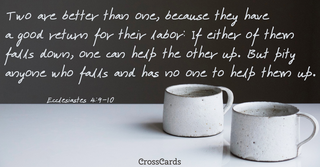Are Two Really Better Than One?
Share

“Two are better than one, because they have a good return for their labor” (Ecclesiastes 4:9).
This verse from Ecclesiastes often gets quoted at weddings, and it is certainly a wonderful explanation of why marriage is special. But the author was also using the word “two” in a broader sense. And if we read the passage with family, friends, or brothers and sisters in Christ in mind, the meaning becomes richer, too.
Most of us have said “I can handle this on my own” at one time or another. In fact, one of my goals as a young adult was to be able to take care of myself so I’d never need help. But this passage makes the point that being independent all the time will actually keep us from our best life.
Photo credit: ©Getty Images/Scyther5
What Does This Verse Mean?

Simply put, the writer was saying that working, living, and cooperating with others always brings a better result than trying to do everything ourselves.
From our beginnings, God designed us with a need for relationships. Our sinful nature, though, leads us to take pride in how strong we can be on our own.
The verse says this is a faulty mindset that often ends up making a person less productive, and lonely. And his use of the phrase “good return” refers not only to our daily work, but to our quality of life in every area, especially our faith.
- We’ll become more aware of others.
- We’ll become more open and transparent about ourselves.
- We’ll become more wise by seeing different insights and ways of getting things done.
- We’ll become less stressed and more efficient.
- We’ll become more trusting of God and loving of others.
Matthew Henry’s Bible Commentary puts it this way:
“In all things union tends to success and safety, but above all, the union of Christians. They assist each other by encouragement, or friendly reproof. They warm each other's hearts while they converse together of the love of Christ, or join in singing his praises. Then let us improve our opportunities of Christian fellowship.”
Some Background on the Book of Ecclesiastes
The first words of this book, “The words of the Teacher, son of David…,” lead into a kind of journal - the author’s sincere search for meaning in this earthly life. Chapter 1 starts with a cry of despair, “‘Meaningless! Meaningless!’ says the Teacher. ‘Utterly meaningless! Everything is meaningless.’”
Chapter 2 gives some of the teacher’s personal testimony about where he looked to find a sense of significance: pleasure; great projects like houses, vineyards, gardens and parks; more herds and flocks than anyone in Jerusalem; silver and gold; wisdom and stature.
But nothing satisfied his soul. He calls all of these things “a chasing after the wind.” The rest of the book explores the author’s observations and discoveries, which lead him back to God.
Photo credit: Unsplash/Joshua-Ness
So, What Happens in Chapter Four?

The reflections of Chapter 4 are concerned with how people treat one another. In verses 1-4, the Teacher sees those around him being oppressed by people who are in positions of power. He comments that their misery must lead them to lament being born at all.
Verses 4-6 portray two ways we can go astray in our attitudes about work. Some put in great effort, but their main motivation is envy of another’s success. Certain others decide that not working at all is the better way. The writer offers this mindset - to find fulfillment in our labor for its own sake, without trying to outdo anyone else.
Then, he states that anyone who remains alone faces a life of hollow and vain work, because they have no one to share the load or rewards with. We can clearly see his frustration and sadness at the outcome of such an existence.
“Again I saw something meaningless under the sun. There was a man all alone; he had neither son nor brother. There was no end to his toil, yet his eyes were not content with his wealth. ‘For whom am I toiling,’ he asked, ‘and why am I depriving myself of enjoyment?’ This too is meaningless — a miserable business!” (Ecclesiastes 4:7-8).
After he makes the declaration in verse 9, the writer gives a convincing argument for being united with others.
“If either of them falls down, one can help the other up. But pity anyone who falls and has no one to help them up. Also, if two lie down together, they will keep warm. But how can one keep warm alone? Though one may be overpowered, two can defend themselves. A cord of three strands is not quickly broken” (Ecclesiastes 4:10-12).
Photo credit: Crosscards.com
What Is the Benefit of Having Someone with You?

Having others alongside us on our journey not only helps us get more done - it’s actually good for our physical, mental and spiritual health.
Companionship eases our loneliness and reassures us that someone is near. Solid friendship keeps us accountable and encourages us to keep going and growing. Community gives us a safe place to celebrate and mourn together. And fellowship often elevates our level of worship to the Lord.
Conversely, keeping to ourselves can lead to some negative outcomes.
- Being stuck where we are, including in bad habits and patterns
- Growing too tired to pursue and accomplish God’s goals for us
- Letting distractions pull us away from the most important things
- Feeling less sensitive and responsive to the needs of others
We can also find ourselves more vulnerable to attacks of the enemy, who wants us to stay focused on ourselves instead of God. We can end up with more discouragement than joy in our hearts.
Finding This Idea in the Rest of Scripture
All through the Bible we can find evidence that close and healthy relationships are part of God’s plan. The first example in creation is when He made a helpmate for Adam.
“The Lord God said, ‘It is not good for the man to be alone. I will make a helper suitable for him’” (Genesis 2:18).
The Psalmists praised God’s love and desire to be close to His people.
“Yet I am always with you; you hold me by my right hand” (Psalm 73:23).
“The Lord is near to all who call on Him…” (Psalm 145:18).
The book of Proverbs offers insights and cautions about seeking out others to walk with.
“A friend loves at all times, and a brother is born for a time of adversity” (Proverbs 17:17).
“An unfriendly person pursues selfish ends and against all sound judgment starts quarrels” (Proverbs 18:1).
In the New Testament, Jesus echoed His Father in Heaven when He reached out to His Disciples:
“‘I no longer call you servants, because a servant does not know his master’s business. Instead, I have called you friends, for everything that I learned from my Father I have made known to you’” (John 15:15).
Later, the Apostle Paul taught that being a believer means having a relationship with God first, and then with other believers. His so-called “one another” verses illustrate how spending time together can bring out the best in us.
“And let us consider how we may spur one another on toward love and good deeds, not giving up meeting together, as some are in the habit of doing, but encouraging one another — and all the more as you see the Day approaching” (Hebrews 10:24-25).
Photo credit: ©Getty Images/Ridofranz
What Does This Mean for Us Today?

Our world has become rather complicated and busy, and most of us feel the pressures of the fast pace. We seem to have more ways to connect with others than ever before, yet so many people still feel isolated. They long for a sense of community and for their work to have a greater impact.
The way to reach that goal is for us to intentionally build some “Ecclesiastes 4:9” relationships. Those don’t happen quickly or easily, though. They require us to give of ourselves, to invest time and energy into someone else’s life. Not every friendship can evolve that far, but the ones that do are well worth the effort.
The author of Ecclesiastes opened up his heart as he wrote the book, and passed along his understanding of what’s really important - namely, loving and being loved. Taking the poetic words of 4:9 to heart will bring us comfort, and help us to find more contentment in daily life.
“Some Christians try to go to heaven alone, in solitude. But believers are not compared to bears or lions or other animals that wander alone. Those who belong to Christ are sheep in this respect, that they love to get together. Sheep go in flocks, and so do God's people.” (Watchman Nee)
Photo credit: ©Getty Images/Rawpixel
